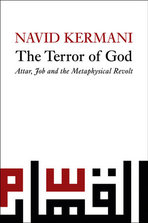“It is impossible not to admire Kermani’s range, his energy and his boundless intellectual generosity and inventiveness.”
New Humanist
“Above all, Kermani’s work is permeated by a profound intellectual ecumenism. This is a scholarship marked by a spirit of creative enquiry.”
The Australian
“A masterful work.”
Journal of Shi’a Islamic Studies

One of Perlentaucher`s Books of the Year 2005.
In his new book author and Orientalist Navid Kermani introduces a piety that is consternating and provocative.
It is the devoutness of saints and fools who are so close to God that they have lost all respect for Him. They rebel against the cruel creator of a world full of suffering.
Their revolt against God shakes the faith of the believer, but also does not fail to move the disbeliever. The person who reads this brilliantly written book will think differently than before – about God and the world.
The “Book of Affliction” written by Attar, the classical Persian poet, is perhaps the darkest poetry ever written by a human being.
Attar’s view of the world is radical and annihilates all consolation and comfort. He unfolds a cosmos of suffering on a grandiose scale; his sarcasm is insane.
Kermani uses the “Book of Affliction” as a point of departure to tell the story of a religiosity that acknowledges and loves God, but harbors wrath against him, a countertheology which begins long before Job and continues long after Georg Büchner.
It runs through many religions, but in a shrouded, previously unexplored sense it connects Judaism, Islam and European modernity – the Old Testament, Sufism and German literature at its darkest.
Navid Kermani’s almost magical power casts the spell of heterodoxy over his readers.
In a world where war and hunger, earthquakes and tsunamis still manifest as they do in our time, the patent despair that this heretical piety professes may be more appropriate than the answers offered in sermons on Sundays and holidays.
“Highly recommended. An excellent exposition of the problem of suffering and how monotheists have attempted to make sense of it without denying their own humanity and without letting God off the hook.” Muslim World
Review: ‘Caught in quarrels with God’